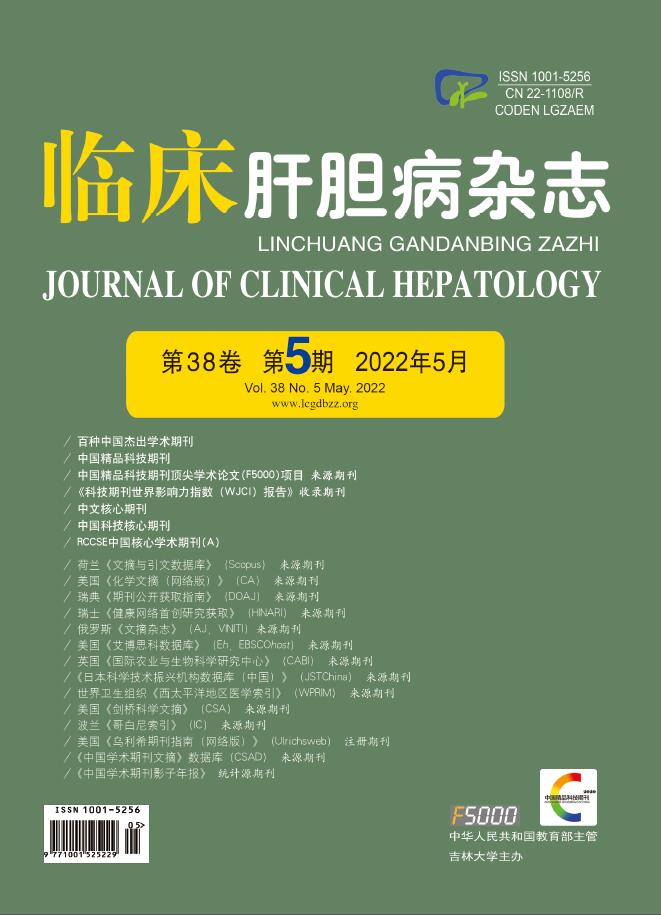| [1] |
GORDAN JD, KENNEDY EB, ABOU-ALFA GK, et al. Systemic therapy for advanced hepatocellular carcinoma: ASCO Guideline[J]. J Clin Oncol, 2020, 38(36): 4317-4345. DOI: 10.1200/JCO.20.02672. |
| [2] |
FINN RS, QIN S, IKEDA M, et al. Atezolizumab plus Bevacizumab in unresectable hepatocellular carcinoma[J]. N Engl J Med, 2020, 382(20): 1894-1905. DOI: 10.1056/NEJMoa1915745. |
| [3] |
VALLE J, WASAN H, PALMER DH, et al. Cisplatin plus gemcitabine versus gemcitabine for biliary tract cancer[J]. N Engl J Med, 2010, 362(14): 1273-1281. DOI: 10.1056/NEJMoa0908721. |
| [4] |
FITENI F, NGUYEN T, VERNEREY D, et al. Cisplatin/gemcitabine or oxaliplatin/gemcitabine in the treatment of advanced biliary tract cancer: A systematic review[J]. Cancer Med, 2014, 3(6): 1502-1511. DOI: 10.1002/cam4.299. |
| [5] |
XIE C, MCGRATH NA, MONGE BONILLA C, et al. Systemic treatment options for advanced biliary tract carcinoma[J]. J Gastroenterol, 2020, 55(10): 944-957. DOI: 10.1007/s00535-020-01712-9. |
| [6] |
REN Z, XU J, BAI Y, et al. Sintilimab plus a bevacizumab biosimilar (IBI305) versus sorafenib in unresectable hepatocellular carcinoma (ORIENT-32): a randomised, open-label, phase 2-3 study[J]. Lancet Oncol, 2021, 22(7): 977-990. DOI: 10.1016/S1470-2045(21)00252-7. |
| [7] |
ABOU-ALFA GK, CHAN SL, FURUSE J, et al. Phase 3 randomized, open-label, multicenter study of tremelimumab (T) and durvalumab (D) as first-line therapy in patients (pts) with unresectable hepatocellular carcinoma (uHCC)[R]. Himalaya, 2022 ASCO GI22.
|
| [8] |
CHEN Z, LU X, KORAL K. The clinical application of camrelizumab on advanced hepatocellular carcinoma[J]. Expert Rev Gastroenterol Hepatol, 2020, 14(11): 1017-1024. DOI: 10.1080/17474124.2020.1807939. |
| [9] |
ZHU AX, MACARULLA T, JAVLE MM, et al. Final overall survival efficacy results of ivosidenib for patients with advanced cholangiocarcinoma with IDH1 mutation: The Phase 3 Randomized Clinical ClarIDHy trial[J]. JAMA Oncol, 2021, 7(11): 1669-1677. DOI: 10.1001/jamaoncol.2021.3836. |
| [10] |
ABOU-ALFA GK, SAHAI V, HOLLEBECQUE A, et al. Pemigatinib for previously treated, locally advanced or metastatic cholangiocarcinoma: A multicentre, open-label, phase 2 study[J]. Lancet Oncol, 2020, 21(5): 671-684. DOI: 10.1016/S1470-2045(20)30109-1. |
| [11] |
PIHA-PAUL SA, OH DY, UENO M, et al. Efficacy and safety of pembrolizumab for the treatment of advanced biliary cancer: Results from the KEYNOTE-158 and KEYNOTE-028 studies[J]. Int J Cancer, 2020, 147(8): 2190-2198. DOI: 10.1002/ijc.33013. |
| [12] |
|
| [13] |
FENG K, LIU Y, ZHAO Y, et al. Efficacy and biomarker analysis of nivolumab plus gemcitabine and cisplatin in patients with unresectable or metastatic biliary tract cancers: results from a phase Ⅱ study[J]. J Immunother Cancer, 2020, 8(1): e000367. DOI: 10.1136/jitc-2019-000367. |
| [14] |
HATO T, ZHU AX, DUDA DG. Rationally combining anti-VEGF therapy with checkpoint inhibitors in hepatocellular carcinoma[J]. Immunotherapy, 2016, 8(3): 299-313. DOI: 10.2217/imt.15.126. |







 DownLoad:
DownLoad: